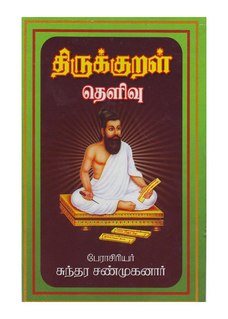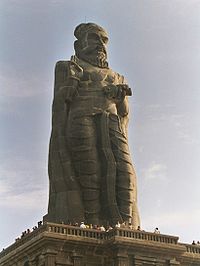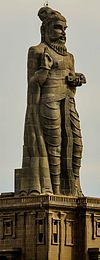
Thiruvalluvar, commonly known as Valluvar, was a celebrated Tamil poet and philosopher. He is best known as the author of the Tirukkuṟaḷ, a collection of couplets on ethics, political and economical matters, and love. The text is considered an exceptional and widely cherished work of the Tamil literature.

Valluvar Kottam is a monument in Chennai, dedicated to the classical Tamil poet philosopher Valluvar. It is the city’s biggest Tamil cultural centre.

The Thiruvalluvar Statue, or the Valluvar Statue, is a 41-metre-tall (133 ft) stone sculpture of the Tamil poet and philosopher Valluvar, author of the Tirukkural, an ancient Tamil work on Dharmic and morality. It is located atop a small island near the town of Kanyakumari on the southernmost point of the Indian peninsula on the Coromandel Coast, where two seas and an ocean meet. The statue was sculpted by the Indian sculptor V. Ganapati Sthapati, who also created the Iraivan Temple, and was unveiled on the millennium day of 1 January 2000 by the then Chief Minister M. Karunanidhi. It is currently the 25th tallest statue in India.

The Central Institute of Classical Tamil (CICT) is a body established by the Government of India with a view to promoting the cause of Classical Tamil. It is located in Chennai.
Channappa D. Uttangi was an Indian author and poet.

The Tirukkuṟaḷ, or shortly theKural, is a classic Tamil language text consisting of 1,330 short couplets of seven words each, or kurals. The text is divided into three books with aphoristic teachings on virtue (aram), wealth (porul) and love (inbam), respectively. Considered one of the greatest works on ethics and morality, it is known for its universality and secular nature. Its authorship is traditionally attributed to Valluvar, also known in full as Thiruvalluvar. The text has been dated variously from 300 BCE to 5th century CE. The traditional accounts describe it as the last work of the third Sangam, but linguistic analysis suggests a later date of 450 to 500 CE and that it was composed after the Sangam period.

Sarvajña was a Kannada poet, pragmatist and philosopher of the 16th century. The word "Sarvajna" in Sanskrit literally means "the all knowing". He is famous for his pithy three-lined poems called tripadi. He is also referred as Sarvagna in modern translation.
Tirukkural, also known as the Kural, an ancient Indian treatise on the ethics and morality of the commoner, is one of the most widely translated non-religious works in the world. Authored by the ancient Tamil poet-philosopher Thiruvalluvar, it has been translated into at least 42 world languages, with about 57 different renderings in the English language alone.

Tirukkural remains one of the most widely translated non-religious works in the world. As of 2014, there were at least 57 versions available in the English language alone. English, thus, continues to remain the language with most number of translations available of the Kural text.
Kannada has at least eight translations of the Tirukkural available as of 2014. Both prose and verse translations have been made in Kannada.
As of 2020, there were at least four translations of the Tirukkural available in Arabic. The Kural text is the first, and so far the only, Tamil work to be translated directly into Arabic. It is also the first Tamil work to be released in the Arabian soil.
Telugu is one of the Indian languages that has had the earliest Tirukkural translations in modern times. As of 2000, there were at least 14 translations of the Kural text available in Telugu.
As of 2015, there were at least three Gujarati translations available of the Tirukkural.
As of 2015, Urdu has at least two translations available of the Tirukkural.
Manakkudavar was a Tamil poet and commentator known for his commentary on the Tirukkural. His is the earliest of the available commentaries on the ancient work, and hence considered to bear closest semblance with the original work by Valluvar. He was among the canon of Ten Medieval Commentators of the Kural text most highly esteemed by scholars. He was among the five ancient commentators whose commentaries had been preserved and made available to the Modern era, the others being Pari Perumal, Kaalingar, Paridhi, and Parimelalhagar.
Kaalingar, also known as Kalingarayar, was a Tamil poet and commentator known for his commentary on the Thirukkural. He was among the canon of Ten Medieval Commentators of the Kural text highly esteemed by scholars. He was also among the five ancient commentators whose commentaries had been preserved and made available to the Modern era, the others being Manakkudavar, Pari Perumal, Paridhi, and Parimelalhagar.
Korean has at least two translations of the Tirukkural available as of 2017.
The Ten Medieval Commentators were a canonical group of Tamil scholars whose commentaries on the ancient Indian didactic work of the Kural are esteemed by later scholars as worthy of critical analysis. These poets lived in the Medieval era between the 10th and 13th centuries CE. Among these medieval commentaries, the commentaries of Manakkudavar, Kaalingar, and Parimelalhagar are considered pioneer by modern scholars.
The Book ofAṟam, in full Aṟattuppāl, also known as the Book of Virtue, the First Book or Book One in translated versions, is the first of the three books or parts of the Kural literature, a didactic work authored by the ancient Indian philosopher Valluvar. Written in High Tamil distich form, it has 38 chapters each containing 10 kurals or couplets, making a total of 380 couplets, all dealing with the fundamental virtues of an individual. Aṟam, the Tamil term that loosely corresponds to the English term 'virtue', correlates with the first of the four ancient Indian values of dharma, artha, kama and moksha. The Book of Aṟam exclusively deals with virtues independent of the surroundings, including the vital principles of non-violence, moral vegetarianism, veracity, and righteousness.
The Book of Inbam, in full Iṉbattuppāl, or in a more sanskritized term Kāmattuppāl, also known as the Book of Love, the Third Book or Book Three in translated versions, is the third of the three books or parts of the Kural literature, authored by the ancient Indian philosopher Valluvar. Written in High Tamil distich form, it has 25 chapters each containing 10 kurals or couplets, making a total of 250 couplets all dealing with human love. The term inbam or kamam, which means 'pleasure', correlates with the third of the four ancient Indian values of dharma, artha, kama and moksha. However, unlike Kamasutra, which deals with different methods of lovemaking, the Book of Inbam expounds the virtues and emotions involved in conjugal love between a man and a woman, or virtues of an individual within the walls of intimacy, keeping aṟam or dharma as the base.









